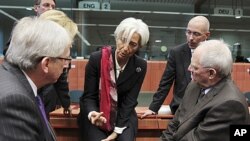European leaders converge on Brussels Sunday for a crucial summit aimed at forging a plan to save the euro currency. As Greece struggles to avoid a default on its debts, EU leaders must try to stop the crisis from spreading to much bigger economies like Italy and Spain, which could threaten the future of the European Union itself.
Two days of violent protests and strikes preceded Greece's latest effort to slash government spending. Defying the protesters, Prime Minister Papandreou succeeded in getting the latest round of austerity measures passed in Parliament, vital to secure the next slice of European and IMF bailout money.
That will give encouragement to European leaders. After months of turmoil and credit downgrades, Sunday's summit is billed as the moment Europe must finally come together to stem the tide of its debt crisis. German Chancellor Angela Merkel struck an upbeat tone ahead of the meeting.
"If we want to use the crisis as an opportunity," Merkel said, "if we are determined to have more Europe, then we must seize the crisis as an opportunity and be prepared for unconventional and quicker action."
Few leaders appear confident of a quick agreement; a second summit has already been penciled in for Wednesday next week. By then, France and Germany say they will have bridged their differences on how Europe's bailout fund should be strengthened.
Analysts say the initial focus will be on how to pump more capital into troubled banks. And that's just the start.
Europe needs to show it will bail out bigger countries like Italy and Spain if they caught in a debt spiral, says Tobias Blattner of Daiwa Capital Markets.
"They need to increase the firepower of the bailout fund so that we finally stop contagion and there are no worries about an eventual Italian default," said Blattner. "This is what they have to do. But unfortunately how it looks now is that the proposals, how they want to leverage this temporary bailout fund, will not be enough. And this is why the summit will most likely disappoint financial market participants."
Tim Ohlenburg of London analyst group the Center for Economic and Business Research says more radical measures are needed for investors to regain confidence in Europe.
"We think there's hope for the eurozone in the long term overall if Europe manages to put a new institutional framework in place and manages either to let go of economies that are not viable in the euro, or find a transfer mechanism," said Ohlenburg.
No eurozone leader dares to talk in public of weaker members dropping the currency. But the only alternative, says Olehnburg, is a truly federal Europe.
"I think the only way to put an end to this situation, in general, is treaty change," added Ohlenburg. "More power to Europe, closer integration, fiscal union."
Such is the gravity of its debt crisis that Europe's very foundations are up for debate.




